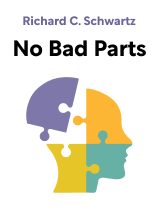

This article is an excerpt from the Shortform book guide to "No Bad Parts" by Richard C. Schwartz. Shortform has the world's best summaries and analyses of books you should be reading.
Like this article? Sign up for a free trial here.
What exactly is self-leadership in Richard Schwartz’s Internal Family Systems model? How does one cultivate the virtue of self-leadership?
The ultimate goal of IFS is to embody what Richard Schwartz calls “self-leadership.” Self-leadership is the state of mind characterized by calmness, curiosity, and a sense of control during challenging situations.
Keep reading to learn about IFS self-leadership and its implications.
The Implications of Self-Leadership
When we notice ourselves feeling openhearted and curious, we’re practicing what Schwartz refers to as IFS Self-leadership or Self energy. Consider the following example. It’s Sunday night. You’re tired and thinking about taking the morning off from work. One part of you tells you that you need to rest, while another part scolds you for slacking. You might feel guilty about wanting a morning off or worried about what your boss will say if you stay home. These feelings stem from parts. However, if you’re practicing Self-leadership, your Self would be curious about these seemingly conflicting desires and want to know more about the motivations behind them.
Schwartz explains that as we “unburden” our parts and become more Self-led, we become a more compassionate version of ourselves, one not controlled by past traumas, fears, and insecurities. This often results in shifting goals and priorities. People who are Self-led are more rooted in their humanity and more in tune with being a part of something larger than themselves, therefore their goals tend to focus more on community than personal advancement. For example, according to Schwartz, Self-led people are more interested in giving back to their communities or exploring creative pursuits.
(Shortform note: Increasing your compassion through IFS self-leadership has additional benefits that Schwartz doesn’t mention. People who are more compassionate are often happier and report a greater sense of well-being. Studies also show that compassionate people are more resilient, have higher self-esteem, and deeper connections with friends and family. Furthermore, in The Compassionate Achiever, Christopher Kukk uses research in biology, neuroscience, and economics to show how compassion can lead to greater personal and professional success.)
Becoming increasingly Self-led also changes how we perceive and interact with the external world. Schwartz argues that when we see our internal parts as inherently flawed, self-serving, and untrustworthy, then we perceive the external world through the same lens. However, as we become more Self-led, we begin to see people, like our parts, as inherently good, well-intentioned, and trustworthy, and so we approach them with compassion and curiosity, and feel more connected to each other and the world around us. Schwartz argues that this mental shift has the power to transform the world—geopolitical relationships, the structure of prisons, and even our interactions with natural resources and the environment.
(Shortform note: Schwartz argues that our understanding of our inner world impacts our perception of our external world. Psychiatrist Dan Siegel takes this idea one step further, explaining that we actually maintain a false distinction between our internal and external world. He explains that our mind is formed in relation to the world around us. In short, our mind doesn’t exist in isolation, but rather through the connection and interaction with our world. Like Schwartz, Siegel argues that changing how we conceptualize our Self will lead to a greater sense of belonging in the world.)

———End of Preview———
Like what you just read? Read the rest of the world's best book summary and analysis of Richard C. Schwartz's "No Bad Parts" at Shortform.
Here's what you'll find in our full No Bad Parts summary:
- A detailed look at IFS—a psychotherapy model that challenges the idea of a unitary mind
- Why it's normal to have conflicting voices in your head
- What IFS therapy looks like in practice and its benefits






